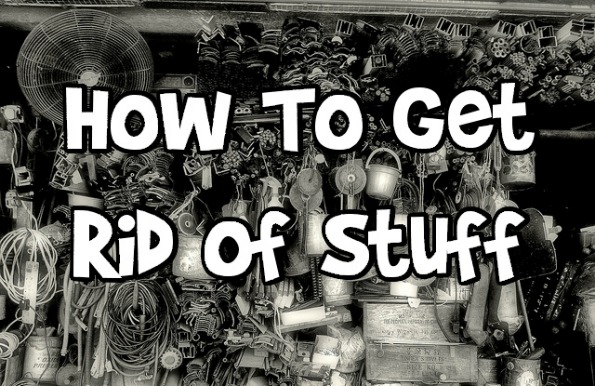
I am moving in five days into a smaller house. I needed to get rid of stuff, which is usually so difficult for me. I'm not a hoarder in the typical definition of hoarding, but I come from a long line of "collectors" on both sides of the family, so it only comes naturally to me to keep stuff. The problem with keeping stuff is that it really bogs you down. It actually can make you feel guilty that you aren't using the stuff, feel claustrophobic because there is so much around you in your home and impede you from being organized because you can never find anything. If you don't believe me, check out this article from LifeHacker on how clutter affects your brain.
Why is getting rid of stuff so hard? There are a number of factors on why it is hard to get rid of stuff. For me, it is again the guilt of throwing away something perfectly fine, adding to the landfills, trying to detach from the sentimental feelings around the object and not wanting to waste money on an object I've already bought. However, there are ways around this and you can even gain a few dollars in the process. Here's what to do to get rid of stuff.
Detach your emotions from the item
As a huge Pearl Jam fan, the words of the song Breath and a Scream really resonate with me, as they talk about all the accumulation we do, spending our money on stuff, rather than experiences. I'm really trying to make a solid effort to buy less and do more. Unfortunately, this didn't solve the problem of all the stuff I already have. And even though I don't buy stuff, I find family members will "hand stuff down" to my husband and I, simply because they want to get rid of it, but want someone else to be responsible for it. What I mean is that the items handed down are usually from a dead family member and it eases guilt to pass the item down while giving it away, rather than send it on its way elsewhere. Problem is, we have no use for it.
We need to detach our feelings from items. Items are not those people. My grandmother did ceramics and I have a ton of the items she made, even though they sat in a cupboard never being used. I finally had to say that I couldn't cart a lot of them to another house, and gave them away. I kept two pieces that I loved the most and had the best memories from being with her, that I will actually place on a shelf in my home. The same went with Cabbage Patch Dolls I had kept from my childhood, which my three boys had no interest in. My grandmother had knitted me some beautiful outfits and it was hard to part with them, but they served no use sitting in a box. I kept the ones that were most special and gave the rest to my nieces. Check out this article from Tisha Morris on The Art of Detatching From Our Stuff if you need some help.
Love everything you have
While this statement is in direct contrast from what I said above, everything in your home should have either a use, a special meaning or look absolutely fabulous. This goes for your wardrobe, your kitchen, your decor and much more. My husband recently built us a gorgeous wood shelf. On this shelf I only placed items with special meaning. There were no Homesense trendy items on this shelf. It held pottery made by a family member that was given as a wedding gift, an item my grandparents had picked up in their travels in the 1960s, which looked good and meant something, a family scrapbook I had made and a few of my most favourite family photos. Every item on that shelf I could look and know its meaning and I loved that. I decided to do that with my artwork too. I got rid of all artwork that didn't really speak to me or my family and replaced it with only items that had meaning, whether it be photographs or paintings.
Figure out the purpose
Beyond items that you want, are items that you need. How many of those small appliances in your cupboards do you actually use? I almost feel like if it is stored in a cupboard, you probably don't use it. This goes for my steamer, juicer and indoor grill. On the other hand, my KitchenAid food processor and my blender are too well-used items in my kitchen, so I keep them on the counter for ease of use. The other items need to go. You might have items like this in your garage, basement, shed and even your bedside drawers. If you keep it for a year and don't use, out it should go.
Where should your stuff go?
If you are worried about the impact of throwing stuff in the garbage, well, you should be. But, if something still works, it doesn't have to go to the landfill. There are many ways to get rid of things you don't want. The simplest way to get rid of stuff is to give it away. I recently gave three boxes of toys in good condition that never get played with away to my youngest son's preschool. They are a non-profit and really appreciate any new toys they get. I also posted items on my Facebook and on community groups to which I'm a member offering items I no longer used, like a set of hot curlers or a baby food recipe book. People snapped these up in no time. The trick here is to make sure someone wants the stuff before you give it to them, so it isn't like you are transferring the guilt of the item on to them. If all else fails you can post a free ad on kijiji giving away your item on pickup, or give it to Goodwill. I regularly get calls from the Diabetes Association, who regularly picks up items right from my doorstep.
If your item is worth a little bit, consider selling it on kijiji, having a garage sale or even checking out eBay. Getting a few dollars for an item sometimes takes out the sting of getting rid of it.
I love books and magazines so much, I would consider myself a hoarder in this sense. I had a stockpile of magazines on my shelves from before my sons were born and lugging these to a new house just did not seem worth it. I took a few hours one day and poured through each magazine, ripping out anything of importance and then recycling the magazines. I'm going to bind my clippings eventually so I can actually do the activities and recipes I've clipped out. As for books, if I had read it and wasn't going to reread it, I gave it to my local library, which accepts donations for their used book sale (which coincidentally, I got many of my books).
Moving forward
Once you've pared down, you don't want to fall again into a trap, so you must be vigilant about not accumulating so much again. I have a few tricks on how I do this. With my clothing, I organize it in such a way that I force myself to wear everything (I also do this with my kids). This makes sure I don't throw that shirt I don't like that much to the back of drawer and pretend it isn't there. I make myself put it on and if I don't like it, it immediately goes in a bag I always keep in my closet, which gets donated when full. This way, I only have clothing I love to wear. For books, once I've read it, even if I loved it (or especially if I do), I pass it on to a friend right away before putting it on my shelf. If I get a gift that I will never use, I don't open the box, but instead keep it for giving to someone else, which I try to do right away so that doesn't turn into a pile of unwanted gifts.
There is also an idea that you should get rid of one item for every new item you bring into your home. This can be especially true with children's toys. Another way to not have to keep buying new stuff or having to get rid of stuff is to spend the money to get quality items. My husband loves throwing stuff out once it has even the slightest flaw, so I've now implemented a rule that we won't buy items that we know are going to break in a year because they were cheap to begin with. We are going to invest in what we buy so that it lasts so long, the kids can't say no to it being handed down (and not just take it out of guilt!).
Bargainmoosers, how do you get rid of stuff?
(Photo credit: Ross Pollack)
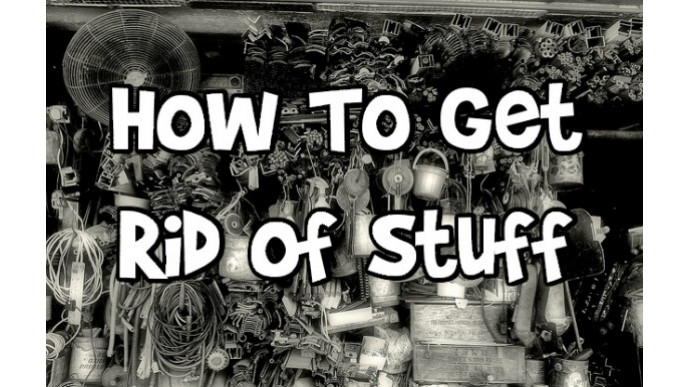

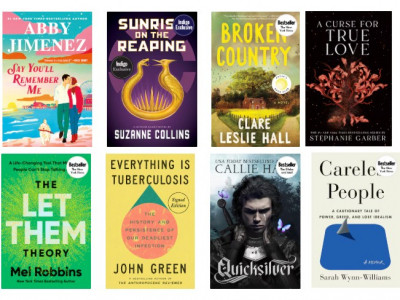

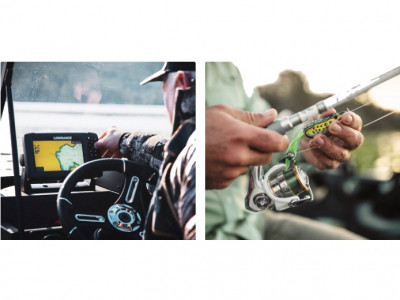
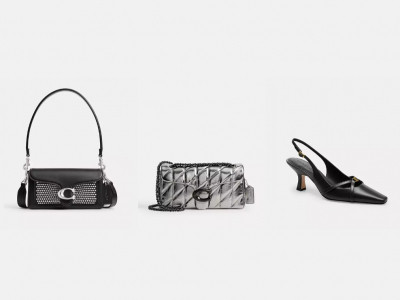



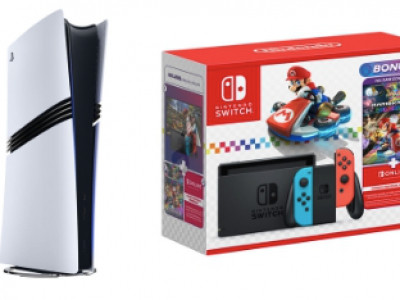





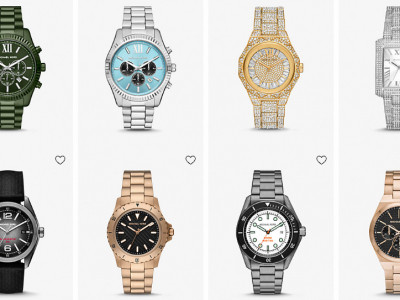






Comments